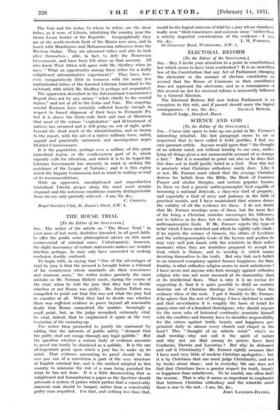SCIENCE AND GOD [To the Editor of the SPECTATOR.] SIR,—I
have only space to take up one point in Mr. Farmer's interesting rebuttal. His last paragraph seems to me so important that to have called it forth justifies, I feel, my
own ignorant article. Anyone would agree that " the thought of an infinite mind, not without kinship to our own, under. lying all things gives a not unreasonable account of so strange a fact." But it is essential to point out also as he does that this does not in itself justify belief in a God. Now this last is precisely what Christian orthodoxy rarely does. Like it or not, Mr. Farmer must admit that the average Christian derives his beliefs from the Bible, the Book of Common Prayer and similar liturgies, and certain popular hymns.
In these we find a grossly anthropomorphic God capable of becoming a national Jehovah, a class-war God of property, and especially a God of envy and jealousy in the field of practical morals, and I have maintained that science denies the validity of all the evidence for these. I do not doubt that Mr. Farmer worships none of these, but the mere fact of his being a Christian minister encourages his followers, not to believe as he does, but to continue believing in their anthropomorphic Gods. If Mr. Farmer rejects the type of belief which I have sketched and which he rightly calls crude ; if he rejects the science of Genesis, the ethics of Leviticus and the anthropomorphic Gods of the hymns and psalms he may very well join hands with the scientists in their softer moments when they are doubtless prepared to accept his God, which is Nature, and to worship it, which means devoting themselves to the truth. But why link such beliefs to an immoral conspiracy against human happiness, for that, frankly, is what orthodox religion seems to most unbelievers ?
I have never met anyone who feels strongly against orthodox religion who was not more incensed at its immorality than at its intellectual flaws. That is why it is no excuse for supporting it, that it is quite possible to distil an esoteric doctrine out of Christian theology less repulsive than the ordinary ideas of the mob. I put it frankly to Mr. Farmer, if he agrees that the sort of theology I have sketched is crude and that nevertheless it is roughly the basis of belief for ninety-nine out of a hundred churchgoers, why should anyone
for the mere sake of historical continuity associate himself with the crudities and thereby have to shoulder-responsibility
for the crimes against truth, beauty and happiness per- petrated daily in almost every church and chapel in the land ? This " thought' of an infinite mind " whici we shall worship—why not call it the spirit of nature and why not see that among its priests have been Confucius, Darwin and Lucretius ? But why be dishonest and call it Christianity ? Mr. Farmer rightly assumes that I have read very little of modern Christian apologetics ; but it is by Christians that one must judge Christianity, and not by books about them ; and in everyday life one does not fmd that Christians have a greater respect for truth, beauty or happiness than unbelievers. To be candid, one often finds the reverse. That is why it seems so important to emphasize that between Christian orthodoxy and the scientific mind there is war to the end.—I am, Sir, &c.,
JOHN LANGDON-DAMES.















































 Previous page
Previous page